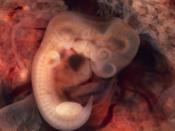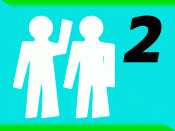Human cloning has always been an issue of controversy, both religiously and ethically. Should a person be cloned for the sake of experimentation? Should a species be cloned in order to reproduce organs? Intense questions have been asked since the discovery of cloning, however the most controversial question is: is cloning right? The cloning of any species, whether human or not, is ethically and morally wrong.
The process of cloning inevitably involves throwing away fertilized embryos. At the current stage of development, many of the embryos selected to live fail to develop and eventually die before birth. In order to produce Dolly, a single live cloned sheep, scientists had to create over two hundred sheep embryos; all but one died or were thrown away. This is just as, if not more, unethical as abortion. Abortion kills embryos, but human cloning creates embryos knowing that most of them will be killed.
At the present time, cloning is experimental and unpredictable; it is not safe to use cloning techniques on human beings. These cloning experiments are unethical - they can do harm. Cloning may have bad results for the embryo and carries a high risk of abnormality in the child. Cloned animals show a high rate of abnormality or disability per live birth. It can put both the cell donor and the birth mother at risk. In one United States study using cows, four out of twelve surrogate mothers died from pregnancy complications. Cloning has a high failure rate; the technique that produced Dolly needed two hundred seventy-seven attempts to achieve one success. Cloning would require tampering with the hormones of the egg donor and could produce multiple miscarriages in the birth mother. Scientists have not one hundred percent guaranteed that the first cloned humans will be normal, which could result in...


